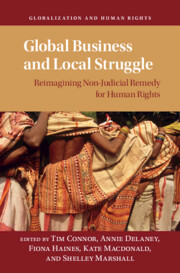Book contents
- Global Business and Local Struggle
- Globalization and Human Rights
- Global Business and Local Struggle
- Copyright page
- Dedication
- Contents
- Figures
- Tables
- Preface
- Acknowledgements
- Abbreviations
- Introduction: Inflated Promises and Small Victories
- 1 Two Countries, Three Industries, Ten Stories
- 2 The Promise of Effective NJM Design
- 3 NJM Design and Human Rights Redress in Practice
- 4 NJMs as Interventions in Fields of Struggle
- 5 NJMs as Community Leverage against Business Power
- 6 NJMs and the Conflicting Roles of the State
- 7 Key Findings
- 8 Towards More Responsive Redress?
- References
- Index
- Series page
7 - Key Findings
Published online by Cambridge University Press: 18 July 2025
- Global Business and Local Struggle
- Globalization and Human Rights
- Global Business and Local Struggle
- Copyright page
- Dedication
- Contents
- Figures
- Tables
- Preface
- Acknowledgements
- Abbreviations
- Introduction: Inflated Promises and Small Victories
- 1 Two Countries, Three Industries, Ten Stories
- 2 The Promise of Effective NJM Design
- 3 NJM Design and Human Rights Redress in Practice
- 4 NJMs as Interventions in Fields of Struggle
- 5 NJMs as Community Leverage against Business Power
- 6 NJMs and the Conflicting Roles of the State
- 7 Key Findings
- 8 Towards More Responsive Redress?
- References
- Index
- Series page
Summary
Chapter 7 draws together the findings of the book concerning the impact of NJM interventions on community and worker struggles to achieve remedy. Lessons are drawn from both widespread failure and small gains. ‘Success’ is more likely, in the sense that aggrieved communities and worker groups are more likely to attain the outcomes they pursue, when NJM interventions facilitate the influence of communities within wider fields of struggle. These interventions include NJMs enhancing the credibility and public awareness of the alleged rights violations, strengthening alliances between actors supportive of redress, leveraging aspects of state and business power that empowered those alliances and enhancing claimants’ skills in advocacy and negotiation. Nonetheless, effective NJM interventions depend on the characteristics of the relevant field of struggle, such as distributions of power within a given supply chain, distributions of business and civil society access to state power and prior histories of campaigning and political organisation in particular sectors and locations.
Keywords
Information
- Type
- Chapter
- Information
- Global Business and Local StruggleReimagining Non-Judicial Remedy for Human Rights, pp. 197 - 211Publisher: Cambridge University PressPrint publication year: 2025
